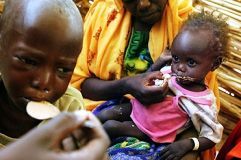Darfur’s children targeted in upsurge of attacks
Nov 17, 2006 (EL-GENEINA) — Sobbing, Khadija Abakr cradles her daughter Aasha close to her breast.
 The three-year-old Darfuri has been shot twice in the neck, the victim of armed militia who are targeting women and children in an upsurge of violence in Sudan’s west.
The three-year-old Darfuri has been shot twice in the neck, the victim of armed militia who are targeting women and children in an upsurge of violence in Sudan’s west.
Abakr recounts how a man she describes as an “Arab” pointed a rifle at her child and screamed “I’m going to shoot her, I’m going to shoot her.”
“I begged him not to do it,” she says. “He was demanding money.” He then shot Aasha twice.
Miraculously the little girl survived. The doctors in el-Geneina hospital said she had been in a critical condition for three days but the bullets missed major arteries.
Many others were not so lucky.
In the attack in the Sirba area where Abakr lives, 13 civilians died and 15 were injured, residents said.
Survivors said the armed men were Arab militia, known locally as Janjaweed. They usually ride on horses and camels, but now had vehicles.
“And who is giving them these new guns and vehicles? — the government of course,” said Adam Abdullahi Jamal el-Din, who lost two members of his family in the attack.
Umdur Ali lost one of her three children in the attack. The two survivors, aged two and four, are perched next to her in the hospital in western Darfur’s state capital el-Geneina.
Ignoring the stench of old blood-stained blankets, they sit quietly on the bed. Her son was shot in both feet and her daughter’s head was bandaged after a bullet apparently ricocheted off her forehead.
The government says the Janjaweed are bandits and denies any links to them. Local officials in el-Geneina said the attacks were tribal clashes.
Experts estimate 200,000 have been killed and 2.5 million forced from their homes in 3-1/2 years of conflict in Sudan’s remote west. Washington calls genocide the campaign of rape, murder and pillage, a charge Khartoum denies.
The International Criminal Court is investigating alleged war crimes in the region.
U.N. humanitarian chief Jan Egeland is cutting his trip to Darfur short after government officials said all the areas he wanted to visit were too dangerous.
He said it was clear neither the government nor the ill-equipped African Union peacekeeping force was able to protect civilians in Darfur, where violence was at its worst since it began in early 2003.
“It’s a protection crisis among the worst in the world,” he said after visiting victims at the el-Geneina hospital. “Civilians are not being defended against armed, terrible, gruesome men who attack women and children.”
The attacks on Sirba were the latest in a surge of violence, despite a peace deal signed in May between the government and only one of three rebel negotiating factions.
Khartoum officials have rejected a U.N. Security Council sanctioning a U.N. takeover of the AU mission with 22,500 troops and police. It likens a U.N. transition to a Western attempt at recolonisation.
On Thursday Sudan accepted in principle U.N. and African Union forces in Darfur but has yet to agree on the number of troops to be deployed, U.N. Secretary-General Kofi Annan said.
(Reuters)
